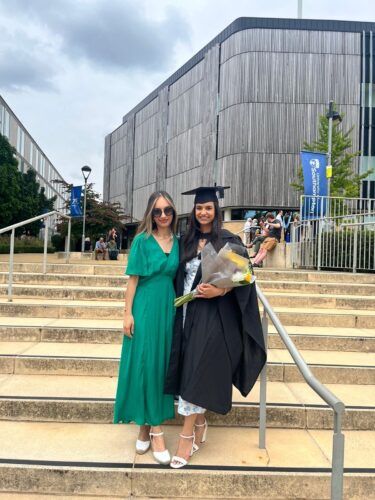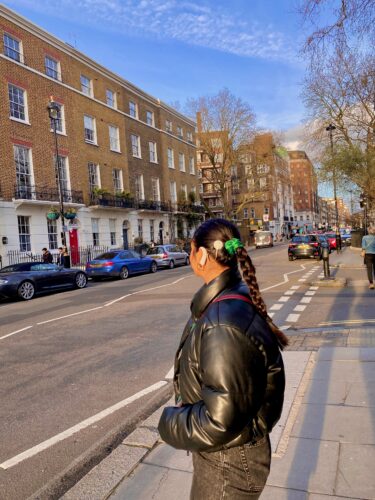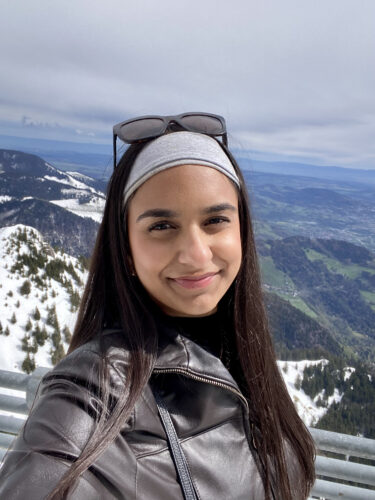This month we are delighted to share an article from Fatima Farhan, about her experiences through education, university and entering the world of work.
Fatima is training to be a Clinical Scientist in Audiology. As a profoundly deaf audiologist, she aims to bring a unique perspective to her work, advocating for inclusivity and accessibility. Her personal experiences fuel her determination to create positive change and empower individuals with hearing impairments to overcome barriers and reach their goals.
School – and self-advocacy
I attended a mainstream school for most of my school years, and it was a multifaceted experience, shaped by both challenges and opportunities. I received my cochlear implant at 9 years old and whilst the implant changed my life for the better, it meant I was incredibly behind in my studies due to my rehabilitation. In addition to that, I spent a lot of time struggling to find my place in this world, in both the hearing and the Deaf community. Many people would say ‘you can hardly tell you’re deaf’ whilst others would say ‘you’re not really deaf if you don’t sign’. This is still something I struggle with today.
My parents sent me to a small secondary school, and this did make my experience a lot smoother. I received incredible support from the teachers and Teachers of the Deaf. They ensured I had working radio aids, sat at the front of classes, had extra time in exams, provided any lesson notes and printed transcripts, and more. However, lot of my peers didn’t understand why this was necessary and didn’t understand how different the playing field was for me, compared to them. Through these challenges, I learnt how to advocate for myself. I hosted presentations talking about what my hearing loss meant, the best ways to communicate with me, the things I struggled with, and how it impacted my day-to-day life. To this day, I strongly believe that learning how to advocate for myself is the best skill I picked up during my school years.
As I had spent so much time focusing on integrating with mainstream society and building my social skills and speech, I was still behind on my studies. I remember in year 10, we had parents evening, and my Maths and Biology teacher told my mum that I would be lucky if I passed my GCSE exams. I knew I wanted to do A-levels and go to University so hearing this was incredibly disheartening. I pushed myself even harder and put in very long hours of work to catch up to my peers and I ended up passing all my GSCE exams with As and Bs (I even managed to score an A in Maths!). This meant I could go on to do my A-levels in Biology, Chemistry and Psychology. I got through my A-Levels and secured a place at University to study Biomedical Sciences.
University – and the challenges of COVID
Going to university was a shock. I went from classrooms of 10 students to lecture halls of 300, having teachers who were specially trained on how to teach a deaf student to lecturers who had no idea what a radio aid was. It was up to me to push for accessible learning, I didn’t have a Teacher of the Deaf who could do it for me. She had taught me the ropes, and now it was my turn to make it happen. I managed to teach each of my lecturers how to communicate with me, how to use the radio aids, and what materials I would need ahead of classes and tutorials.
In my second year, COVID hit. The university closed and everything was moved online. Lectures were hosted over Zoom – the presentations would be shared virtually with the lecturer talking over the slides. This took away the ability for me to lip-read lecturers and to hear their voices clearly through a radio aid. Those initial few months in COVID were the hardest. I had no motivation to join lectures or to study. I would get so frustrated trying to listen back to the lecture recordings because I just could not hear what was being said. I then found the strength to pick myself back up and advocate. I was determined to do well in my degree, but I needed support. I got in touch with the university’s disability services and asked what could be done to make classes accessible. From then on, we had organised for lectures to have a transcript, using a software, and for me to have a note taker. There were also meetings with lecturers to help understand what they could do to make things easier for me, such as putting the camera on so I could lipread, and improving their microphone systems, so that their voices were clearer. I graduated in 2021 with a 1st Class Honours.

Becoming an audiologist – improving deaf futures
When I was diagnosed with a profound hearing loss, my parents had no idea what to expect. This wasn’t exactly time where you could find all your answers easily on Google. All my parents were told were that ‘I would never hear, and I would be lucky to string 3 words together’.
They moved continents to find the best possible support and tried to envision what life would be like for me. Learning about the journey they had and the incredible support they received from a multidisciplinary team of people, I wanted to provide that for others. I love science and I love working with people, so it seemed like a natural fit for me to go into audiology.
Ultimately, becoming an audiologist as a deaf person represents both a personal and professional journey for me. It is a testament to the resilience and determination of deaf individuals to break barriers, challenge stereotypes, and make meaningful contributions to the field of audiology. By combining my personal experiences with my professional expertise, I strive to advocate for accessibility, inclusivity, and excellence in audiological care.
Masters studies – getting the right support
My audiologist training so far has been great. I have had the opportunity to talk to other families about their child’s hearing loss, as well as join local working groups with other professionals about changes that could be made to improve services for deaf children.
My training is structured so that I get one study day a week to work on my Masters. The opportunities presented through my training can be really motivating when it comes to putting my head down and studying for my Masters.
I got in touch with Disability Student Allowance (DSA) and Access to work (ATW) so that I could receive support for both my full-time job and for my studies. Over the years, I have learnt exactly what support I need, and this has made it a lot easier for me to discuss with DSA and ATW what actions are needed.
Changes I’d like to see – what a better deaf future looks like
- Deaf awareness and sensitivity training
Deafness affects individuals in many ways. It’s important that this is highlighted when we talk about raising awareness, whether that is in education or in the workplace. Creating an understanding about Deaf culture, different communication strategies, and the unique needs of a deaf person can foster an environment that is inclusive. This also helps remove any misconceptions and barriers about deafness.
- Inclusive Curriculums
During my school years, I never had the chance to see what deaf adults were doing or understand what life was like in the ‘real world’ for deaf people. I think involving content that reflects the experiences and contributions of deaf individuals would be a great way to combat that and to promote diversity and cultural competency.
- Increased accessibility as well as flexible accessibility
Education and workplace settings should prioritize accessibility by providing a range of accommodations tailored to the needs of deaf individuals. This includes easy access to sign language interpreters, captioning services, assistive listening devices, and visual aids to ensure effective communication and participation. I think a lot of the times, assumptions can be made and so only one method is used for deaf people. Thus it’s important to remember that deaf people all have unique needs – those should be understood for the appropriate accessibility to be applied.
- Promoting inclusive policies
It can be challenging and exhausting to advocate for yourself. Therefore, I believe that educational institutions and workplaces have a role as advocates. They should adopt and promote polices that prioritise the needs of deaf people. This may include policies related to recruitment and hiring practices, reasonable accommodations, accessibility of facilities and technology, and support for Deaf culture and identity.




